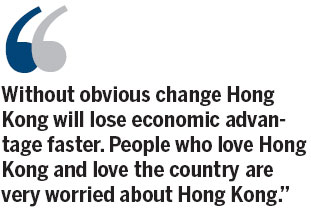HK economy's hidden peril
Updated: 2013-09-11 06:52
By Zhou Bajun(HK Edition)
|
|||||||
On Sept 3, Zhang Dejiang, chairman of the National People's Congress Standing Committee (NPCSC), said to a delegation of Hong Kong's disciplined forces that it is top priority for Hong Kong to sustain its economic prosperity, because the city's status is determined by its economy's state. Zhang's comment pierced the truth with a single pertinent remark. It serves as a wake-up call to those Hongkongers neglecting the Hong Kong economy's hidden peril that is those indulging in politics led by the opposition camp.
It is well known Hong Kong is an international center of finance, trade and transportation since the 1970s. For the city's fantastic and tremendous economic achievements the international community has given it the laurel of "Oriental Pearl".
However, shortly after Hong Kong returned to China, the opposition camp, controlled by a few Western countries, began to violate the Basic Law and the "One Country, Two Systems" principle. Recently, the opposition has launched unprecedented fierce attacks on the central government while the territory's constitutional development approaches universal suffrage.
With the aim of seizing the governing power of Hong Kong, the opposition is implementing the "Occupy Central" movement that will destroy Hong Kong's status as an international finance center. Opposition leaders believe Beijing cherishes Hong Kong like its eyes, and will compromise with the opposition in the arrangement of universal suffrage. Nevertheless, it is wrong thinking.

The central authorities always pay great attention to Hong Kong, making every effort to ensure the HKSAR's economic development and social progress. But, the political situation in Hong Kong is not determined solely by Beijing. Here in Hong Kong, a few Western countries have significant strength and influence. On the other hand, Beijing won't sacrifice national sovereignty, security and development for the territory's temporary social stability. Thus, the more Hong Kong gets deeply entangled in political disputes, the more perilous its economic status will be.
With Hong Kong focusing on politics, Shanghai, our country's other international city, is developing rapidly. The central government also supports Shanghai. One month ago, the State Council approved the establishment of a pilot free trade zone. The new zone will be built on the basis of four existing bonded zones. Covering 29 square kilometers, larger than one quarter of Hong Kong Island, it is a milestone in the development of not only Shanghai but also China's more proactive opening-up strategy. Predictably, it will promote Shanghai as a new platform for China's global economic competitiveness and its trade cooperation with other countries, allowing Shanghai to become an international finance and transportation hub by 2020.
Some Hongkongers may not agree with what I've written above. They may argue that the Global Competitiveness Report 2013-2014, released by the World Economic Forum on Sept 4, ranked Hong Kong two places higher in its latest ranking of 148 economies of the world. I highly appreciate this good news too. However, Hong Kong has to be wary that its competitiveness mainly comes from infrastructure. The city should strengthen innovation and accelerate economic transformation otherwise it will fail to maintain its economic position in face of more vigorous global competition in the 21st century.
Though Hong Kong continues to have advantages in finance, its competitive edge in port transportation is falling. Both Hong Kong and Shenzhen authorities' statistics display Shenzhen port's container throughput surpassed Hong Kong port in the first half of 2013. Shenzhen will surely knock Hong Kong off its perch as the third busiest port in the world this year.
However, many Hongkongers don't like any information indicating their city's competitiveness is weakening.
On June 18, the China Institute of City Competitiveness announced Hong Kong ranks fifth on the 2013 Chinese Province and City Competitiveness List, among 27 provinces and autonomous regions, four municipalities, as well as Hong Kong, Macao and Taiwan. The list measures the criteria of economy, finance, commerce, technology and human resources. Comparably, Hong Kong ranked second on last year's list. It seems that Hong Kong competitiveness has fallen among fast-growing regional Chinese economic hubs.
But local media didn't consider it seriously. A television program even publicly queried the educational background of the head of the think tank. It is strange that no one in Hong Kong asked the same question last year. And logically, the educational backdrop of the organization's head is not relevant to the list's methodology.
Looking at Hong Kong, some people are wallowing in political fighting against the central government and some are swelling with pride at its fading economic glory. Without obvious change Hong Kong will lose economic advantage faster. People who love Hong Kong and love the country are very worried about Hong Kong. So, we stress very clearly the NPCSC chairman's instruction.
The author is a veteran current affairs commentator.
(HK Edition 09/11/2013 page1)